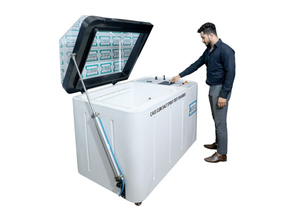What is a Salt Spray Chamber and its Importance in Corrosion Testing
Cuerpo
In today’s world, durability is a key factor in product design and manufacturing, especially for industries like automotive, aerospace, construction, and marine. Corrosion, caused by environmental exposure, is one of the biggest threats to material longevity. This is where a salt spray chamber steps in as an essential tool for testing and evaluating the corrosion resistance of materials, coatings, and components.
In this article, we’ll dive into what a salt spray corrosion chamber is, how it works, and why it’s so important in corrosion testing. Let’s explore!
What is a Salt Spray Chamber?

A salt spray testing chamber, also known as a salt fog chamber, is a specialized testing device designed to simulate a corrosive environment. It is primarily used to evaluate the resistance of metals, coatings, and other materials to corrosion caused by exposure to salt-laden conditions.
These chambers create a controlled atmosphere where specimens are exposed to a fine mist of saline solution. This environment mimics years of natural wear and tear in just a few hours or days, making it an invaluable tool for product testing and quality control.
How Does a Salt Spray Chamber Work?
Corrosion Chambers operate using a simple yet effective process:
salt spray chamber working principle:
- Saline Solution Preparation:
A saline solution, typically a mixture of water and sodium chloride (NaCl), is prepared according to standardized specifications like ASTM B117 or ISO 9227. - Atomization of the Solution:
The saline solution is atomized into a fine mist using a nozzle system. This mist is then distributed evenly inside the chamber. - Exposure of Specimens:
Test specimens are placed inside the chamber on racks, ensuring they are exposed to the mist uniformly. - Temperature and Humidity Control:
The chamber maintains specific temperature and humidity levels to replicate real-world corrosive conditions accurately. - Duration:
The test duration varies based on the material, coating, or product being tested. It can range from hours to several days, depending on the testing requirements.
Why is Corrosion Testing Important?
Corrosion is a natural process that occurs when materials, especially metals, deteriorate due to environmental exposure. It leads to significant economic losses and can compromise the safety and performance of products. Salt spray chamber for corrosion testing helps manufacturers:
- Improve Product Durability: Identify materials and coatings that withstand harsh conditions.
- Ensure Safety and Reliability: Avoid structural failures caused by corrosion in critical applications.
- Meet Industry Standards: Comply with international quality and safety regulations.
- Save Costs: Reduce maintenance and replacement expenses by selecting the right materials upfront.
The Role of Salt Spray Chambers in Corrosion Testing
Corrosion testing instruments are indispensable tools in corrosion testing for several reasons:
1. Accelerated Testing
Traditional methods of evaluating corrosion involve years of natural exposure to environmental conditions. Salt spray fog chambers drastically reduce this time, delivering results in days instead of years.
2. Consistency and Repeatability
These chambers provide a controlled environment, ensuring consistent and repeatable results. This is critical for comparing the performance of different materials and coatings.
3. Versatile Applications
Salt Spray testing chambers are used across various industries, including automotive, aerospace, marine, electronics, and construction. They test everything from metal parts and fasteners to protective coatings and paints.
Key Components of a Salt Spray Test Chamber
To understand how these chambers work, it’s important to know their key components:
- Test Chamber: The main enclosure where specimens are placed for testing.
- Salt Solution Reservoir: Stores the saline solution used for creating the mist.
- Atomizing Nozzle: Converts the solution into a fine mist for even distribution.
- Temperature Control System: Maintains the desired temperature inside the chamber.
- Exhaust System: Removes excess mist to prevent over-saturation.
Standards Governing Salt Spray Testing
Salt spray testing follows specific international standards to ensure consistency and reliability. Some of the most commonly used standards include:
- Salt spray chamber ASTM B117: The most widely recognized standard for salt spray testing.
- ISO 9227: International guidelines for conducting salt spray tests.
Manufacturers adhere to these standards to meet industry regulations and customer expectations.
Advantages of Using Salt Spray Test Chambers
Salt spray corrosion chambers offer numerous benefits:
1. Quick Results:
Simulate years of exposure in a matter of days, saving time in product development cycles.
2. Cost-Effective:
Minimize long-term costs by identifying potential issues early in the design process.
3. Enhance Product Quality:
Ensure your products can withstand harsh environments, boosting customer satisfaction and trust.
Limitations of Salt Spray Testing
While salt spray testing is invaluable, it does have some limitations:
- Not a Perfect Real-World Replication: The test environment may not account for all variables present in natural corrosion processes.
- Limited to Specific Conditions: It primarily simulates salt-laden environments and may not represent other corrosive conditions like acid rain or industrial pollution.
Industries Benefiting from Salt Spray Chambers
Salt spray fog chambers are widely used in various industries, such as:
- Automotive: To test the durability of car parts, fasteners, and coatings.
- Aerospace: For ensuring the corrosion resistance of aircraft components.
- Marine: To evaluate materials exposed to salty sea air and water.
- Construction: For testing building materials like metals, paints, and finishes.
Future of Salt Spray Testing
Advancements in technology are driving the evolution of salt spray testing. Modern chambers now feature:
- Automation: Streamlined processes and reduced manual intervention.
- Data Analysis: Real-time monitoring and reporting for improved accuracy.
- Sustainability: Eco-friendly practices, including energy-efficient systems and biodegradable salts.
Conclusion
A salt spray test machine is more than just a testing device; it’s a critical tool for ensuring the quality, durability, and safety of products in corrosion-prone environments. By simulating real-world conditions in a controlled setting, it helps manufacturers make informed decisions, meet industry standards, and deliver reliable products to their customers.
Whether you’re in the automotive, aerospace, or marine industry, investing in salt spray testing is a smart move that pays off in the long run. With advancements in technology, the future of corrosion testing looks even more promising.
FAQs
1. What is the purpose of a corrosion test chamber?
A salt spray chamber touch screen is used to simulate corrosive environments and test the corrosion resistance of materials, coatings, and products.
2. How long does a salt spray test take?
The duration varies based on the testing requirements, typically ranging from a few hours to several days.
3. Which industries use salt spray test chambers?
Industries like automotive, aerospace, marine, construction, and electronics rely on salt spray fog chambers for product testing.
4. Are salt spray tests reliable?
Yes, they provide consistent and repeatable results, though they may not account for all real-world variables.
5. What standards govern salt spray testing?
Common standards include ASTM B117 and ISO 9227, which ensure consistency and reliability in testing.
#saltspraychambermanufacturer #corrosiontestchamber #testinginstruments #effectivelabindia #saltspraytesting #saltsprayfogchamber #saltspraytestchamber #saltspraychambersupplier











Comentarios